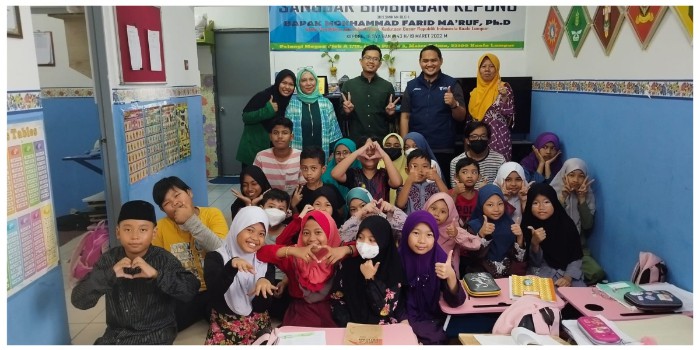KUALA LUMPUR, MALAYSIA — Ustaz Luqmanul Hakim Abubakar, Lc, MRI, one of the Dai Ambassadors of Dompet Dhuafa 2023 assigned to neighbouring countries, Malaysia, again visited one of the Guidance Centers (SB) in the Kepong area, Kuala Lumpur, Monday (3/4/2023). SB is a place of study for Indonesian children born in Malaysia but do not have citizenship, a.k.a stateless. Their stateless status is due to their parents, migrant workers from Indonesia who are not allowed to marry and have family in Malaysia.
The presence of SB is one of the solutions to the critical problems currently affecting the children of Indonesian Workers (TKI) in neighbouring countries. The problem is that Indonesian children need help to get access to education. Due to their stateless status, the children were not allowed to attend official educational institutions owned by the Malaysian Government. But on the other hand, they also do not allow schools in Indonesia.
“More than 80 per cent of the students here are children with citizenship problems. They do not have access to official educational institutions,” said Pak Akil, an administrator of SB Kepong who welcomed Ustaz Luqmanul Hakim.
Baca juga: Dapat Lampu Hijau KBRI, Dompet Dhuafa Inisiasi Pusat Belajar Mengaji Di Malaysia

Ustaz Luqman was asked to lecture ahead of iftar with SB Kepong students and teachers on that occasion. The studio is one of two SBs under the Special Branch Management of Muhammadiyah Malaysia.
That day was the second opportunity for Ustaz Luqman to visit SB Kepong. For him, it is always lovely to see children in limited facilities and simple life, but they are still enthusiastic about learning, counting, writing, and spelling sentences. They also maintain their Indonesian language and dialect.
SB Kepong has around 60 students at the kindergarten and elementary school levels. They occupy the narrow spaces of two small flats in the Pelangi Magma apartment, which are transformed into study rooms. The room felt cramped because one was used simultaneously for two levels of classes. The first grade is merged with the second grade. The third grade is merged with four, and so on.
Baca juga: Urgensi Pendidikan bagi Anak-Anak TKI: Catatan Dai Ambassador Dompet Dhuafa di Malaysia
SB Kepong’s teaching staff are energetic young people. Some are students of International Islamic University Malaysia, and some are PKL students from several universities in Indonesia. In addition, other volunteers come from expatriates. They engage themselves with highly passionate devotion. They need more luxury to get here. Everything is moving because of the call of conscience to save the education of the country’s children.

Taking care of the children of migrant workers is not an easy matter. Like taking care of children, it takes extra patience. Moreover, most children here feel they need more education in their homes, either because of busy working parents or having no mother and father or because of a marriage that has been troubled from the beginning.
Some SB Kepong students were abandoned since childhood and cared for by their neighbours or co-workers. When you first enter the studio, let alone the basic skills of reading, writing or arithmetic, even the questions of civility and manners are sometimes far from expectations. Perhaps that is one of the reasons why the motto of this guidance studio is neatly written on the wall of the main study room, striking from the first-time people enter it: “Civilized before knowledge.”
The Center of Guidance (Sanggar Bimbingan) has been a priority program of the Indonesian Embassy in Malaysia for the last three years. There are approximately 35 studios registered as fostered by the Indonesian Embassy. Although informal and without uniforms, students in the studio are expected to get enough learning materials, like schools with a curriculum to pursue learning packages A and B. They can get a diploma if they graduate at the end of the learning period, and their names are recorded in the National Education System in Indonesia.
In addition to primary education and character, the target of the Indonesian Embassy through this program is to facilitate the management of citizenship documents for these children. The Indonesian Embassy will assist with the process, starting from registering, providing citizenship documents, and then they are expected to return to the country and continue their education in Indonesia.
The story of the children of Indonesian migrant workers in Malaysia is a long series of problems across generations. The situation in Malaysia is quite complicated. Malaysia’s labour laws prohibit migrant workers from marrying or having children, but the fact is that many migrant workers marry in Malaysia. Marriage is a basic human need, and children are born consequently. It takes great minds and clean hearts to unravel and find a way out. (Dompet Dhuafa/Ustaz Luqmanul Hakim/Ronna)


